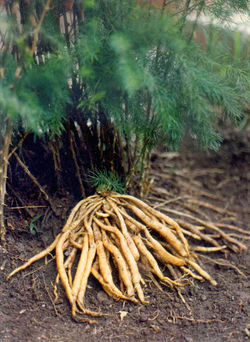Asparagus racemosus
Other Names: Aheruballi, Asparagus, Asparagus Root, Asperge des Indes, Asperge Indienne, Asperge Sauvage, Asperges Racemosus, Chatavali, Espárrago Racemosus, Espárragos Racemosus, Indian Asparagus, Inli-chedi, Kairuwa, Majjigegadde, Narbodh, Norkanto, Philli-gaddalu, Satavari, Satawar, Satawari, Satmooli, Satmuli, Shatamuli, Shatavari, Shatmuli, Shimaishadavari, Sitawari, Toala-gaddalu, Wild Asparagus.
Asparagus racemosus is a plant used in traditional Indian medicine (Ayurveda). The root is used to make medicine.
Special Precautions of Asparagus Racemosus
- Don’t confuse asparagus racemosus with Asparagus officinalis, which is the type of asparagus that is commonly eaten as a vegetable.
- Though adverse effects of shatavari are rare, allergic reactions are the most common one among the reported cases. Such reactions are generally seen in people, who are allergic to asparagus.
- Use of this herb during pregnancy and breastfeeding is still a disputed subject. So it is not recommended for such women. If you are taking diuretics or lithium medication, then, avoid shatavari.
- Even people with kidney disorders and edema must avoid use of this herb. Those with heart diseases and lung congestion should not use shatavari.
- Some may experience anxiety, dizziness and fatigue, as they use shatavari. Even stomach ache and flatulence have been reported as side effects of this herb.
- Regular use of this herb may cause weight gain in some people. Breast tenderness and premenstrual stress are also among the possible side effects.
- It has also been suggested that shatavari should be avoided by women having massive fibrocystic breasts and estrogen induced disorders.
- Lithium interacts with Asparagus Racemosus.
Benefits and uses of Asparagus Racemosus are
Shatavari is popular for its rejuvenating properties and its use in treating various conditions relating to the female reproductive system. In fact, the Sanskrit meaning for the name shatavari is, "she who possesses a hundred husbands". This refers to the effect of this herb in improving fertility and vitality in females. It is one of the main herbs used in Ayurveda, for boosting the reproductive health in females. In India, this herb has been used for a very long time and is claimed to be effective in treating various ailments. shatavari is mainly used to maintain hormonal balance in females, so as to treat or prevent conditions like polycystic ovary syndrome (PCOS). It is also used for alleviating premenstrual syndrome and menopausal symptoms. Uses :
- Pain.
- Anxiety.
- Stomach spasms.
- Uterine bleeding.
- Premenstrual syndrome (PMS).
- Upset stomach.
- Stomach ulcers.
- Diarrhea.
- Bronchitis.
- Diabetes.
- Dementia.
- Easing alcohol withdrawal.
- Starting breast milk production.
